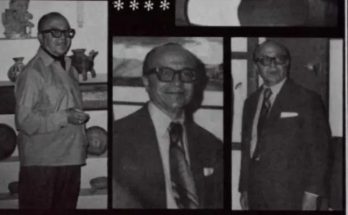By Luis Felipe Rodriguez
Francisco González (Pancho el sol) was someone who was part of the heart of this city, itself the heart of Mexico. He was born in San Miguel in 1954 and had been a shoe shiner for 56 years, from the time he was 12 years old. But even at the age of ten, he was selling newspapers and was an apprentice to Don Marcelino Luna, known as “Chelín,” at the Aldama barber shop on Relox. Jorge Cadena and Nico Tovar were also working as barbers on the same street and they were called Los compadres—the godfathers. At that time, there were none of the electric tools that exist today. They used those mechanical hair clippers that some of us have had to suffer. Eventually, Don Francisco dedicated himself to cleaning shoes.
Many people may remember his predecessor in the same spot in the Jardin—the popular Basilia or Basi. He gave several kids the opportunity to learn the trade but always with the understanding that they continue studying, so they wouldn’t ask their parents for money. There was great affection between Pancho and Basi, and they adopted each other as grandfather and grandson. When Pancho studied at CBT, Basi was officially his tutor. But Francisco had a difficult passage into adolescence and didn’t finish high school.
Pancho still remembered Basi, and acknowledged that he received the best lessons from him: discipline and perseverance. He said, “Basi was hard. That’s why some couldn’t take it and left. Then they started working from seven in the morning until half past nine at night, with rain, thunder, or lightning. He was demanding. He made me responsible.”
He remembered that one day, when he got to work, a taxi driver told him: “Basi was having a good time here.” Pancho sensed that there was some reason for his tutor’s apparent drunkenness, and when he arrived at his house, he confirmed his suspicions. Basi was having a diabetic crisis. He was hospitalized for three months but lost the battle. Pascual Hernández Hernández, the popular Basi, died on March 11, 1991, at the age of 74.
According to what he had said, Basilia was the nickname he was given because as a child he worked with an old lady who had that name. She used to sell petroleum appliances. For the younger generation, we should say that petroleum appliances are the grandmothers of today’s gas stoves.
Pancho was a common image in the Jardin of San Miguel for many years, and he learned his trade from Basi. Tourists and souvenir hunters have photographed him, either alone or placing themselves with him in the photos. Don Pedro Vargas, the famous tenor of San Miguel, called “the Samurai of song,” used to go to Pancho to have his shoes cleaned. Pedro liked to talk, and he would stay longer than the service lasted. Pancho also remembers the tenor’s generous tips. He would give him a 20 peso bill and ask him to get the day’s papers, one of each. Pancho says that would cost ten pesos, but Vargas wouldn’t accept his change. He would say, “That’s for you.” Pancho has been interviewed by a popular Chilean host of a program in the Untied States. Other media outlets have also interviewed him.
Pancho was passionate about his loyalty to the PRI party and remembered the happy election days in which he participated. He smiled recalling the attention he received from mayors such as Don Salvador de Lara, Don Pedro Gerez, Don Antonio Gil, and various others.
He learned many secrets of the trade from Basi. For example, Basi used to prepare a special soap that turned green when applied to light-colored shoes. Pancho remembered one of his clients telling him to put the “green sauce” on his shoes and he couldn’t do it. Basi took his secret to the grave and now neutral soap or pumpkin soap is used. Customers knew that Pancho knew his trade and would treat shoes with professionalism. They knew he would use the necessary ingredients and tools to provide a good service. This was something that he had instilled in his successors, his son and a godson.
Other young people followed Basi and learned the trade. Some didn’t like it and changed their career. Others continued studying, finishing university. Pancho remembered someone he called “Che,” although his real name is Josué. He is in the U.S. now. We remember some of the taxi drivers: Don Bony, el Zorrita and his sons, Toño, Enrique, and Pancho, the Aguados, the Zúñiga, Panchito, the “Lobos,” Don Pedro Ramírez and his sons Pedro, Ramiro, and Rodolfo, etc.
(To be continued)




